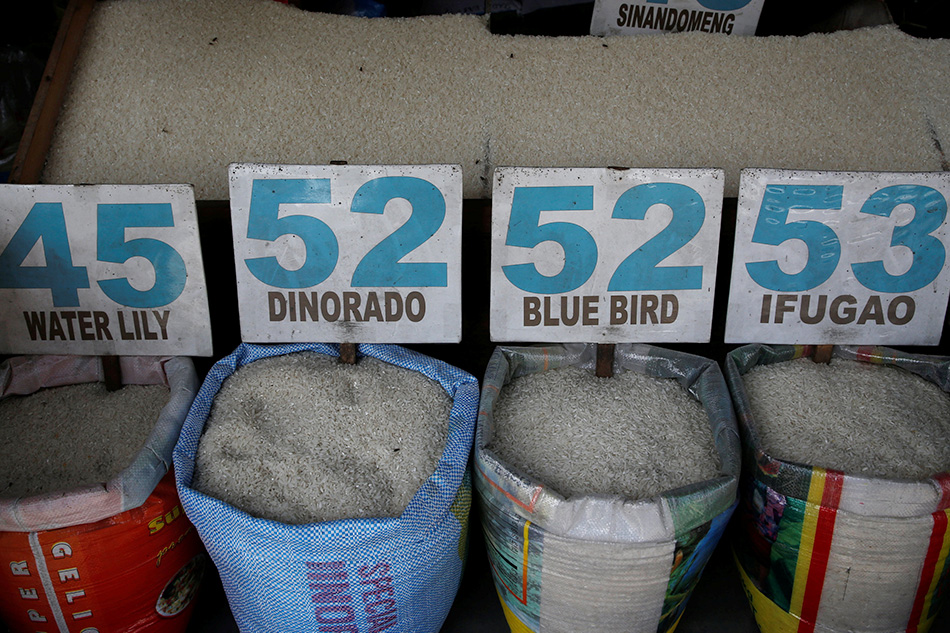Agri chief Piñol seeks extension of rice import restriction | ABS-CBN
ADVERTISEMENT

Welcome, Kapamilya! We use cookies to improve your browsing experience. Continuing to use this site means you agree to our use of cookies. Tell me more!
Agri chief Piñol seeks extension of rice import restriction
Agri chief Piñol seeks extension of rice import restriction
Reuters
Published Oct 17, 2016 07:40 PM PHT
MANILA - The Philippines' farm minister is making a last-ditch appeal to his colleagues in the cabinet to postpone opening the country to higher rice imports next year, saying local farmers need more time to prepare to compete with cheaper grains.
MANILA - The Philippines' farm minister is making a last-ditch appeal to his colleagues in the cabinet to postpone opening the country to higher rice imports next year, saying local farmers need more time to prepare to compete with cheaper grains.
President Rodrigo Duterte's economic team has decided not to seek another extension of the so-called quantitative restriction on rice imports, which is to be scrapped in June 2017 under an agreement with the World Trade Organization (WTO).
President Rodrigo Duterte's economic team has decided not to seek another extension of the so-called quantitative restriction on rice imports, which is to be scrapped in June 2017 under an agreement with the World Trade Organization (WTO).
Agriculture Secretary Emmanuel Piñol told a Senate public hearing on Monday he needed two years to help Filipino rice farmers prepare to compete with cheaper varieties produced by the country's main suppliers, Vietnam and Thailand.
Agriculture Secretary Emmanuel Piñol told a Senate public hearing on Monday he needed two years to help Filipino rice farmers prepare to compete with cheaper varieties produced by the country's main suppliers, Vietnam and Thailand.
Any move to lift the restriction would be welcomed by the two rice exporters Thailand and Vietnam, the main participants any time the Philippines issues tenders seeking the grain. Philippine economic officials say the cheaper imports would also bring down the retail costs of the country's food staple.
Any move to lift the restriction would be welcomed by the two rice exporters Thailand and Vietnam, the main participants any time the Philippines issues tenders seeking the grain. Philippine economic officials say the cheaper imports would also bring down the retail costs of the country's food staple.
ADVERTISEMENT
"All that we're asking for is a grace period of two years," Piñol said, speaking to the Senate about his efforts to convince the cabinet to extend the import restriction.
"All that we're asking for is a grace period of two years," Piñol said, speaking to the Senate about his efforts to convince the cabinet to extend the import restriction.
The Southeast Asian nation, one of the world's biggest rice importers, has kept the import restriction in place since 1995 when it joined the WTO, which has allowed the Philippines two extensions since then.
The Southeast Asian nation, one of the world's biggest rice importers, has kept the import restriction in place since 1995 when it joined the WTO, which has allowed the Philippines two extensions since then.
The Philippines last won approval in 2014 to keep the restriction for the private sector until June 2017, but lifted the annual quota to 805,200 tons from 350,000 tons, and cut the tariff to 35 percent from 40 percent.
The Philippines last won approval in 2014 to keep the restriction for the private sector until June 2017, but lifted the annual quota to 805,200 tons from 350,000 tons, and cut the tariff to 35 percent from 40 percent.
The Philippines imports more than a million tonnes of rice a year, including tariff-free purchases by the state grains agency the National Food Authority.
The Philippines imports more than a million tonnes of rice a year, including tariff-free purchases by the state grains agency the National Food Authority.
Socio-economic Planning Secretary Ernesto Pernia said last month that he and Finance Secretary Carlos Dominguez and Budget Secretary Benjamin Diokno had agreed to scrap the quantitative restriction, believing that competition would encourage local farmers to improve efficiency.
Socio-economic Planning Secretary Ernesto Pernia said last month that he and Finance Secretary Carlos Dominguez and Budget Secretary Benjamin Diokno had agreed to scrap the quantitative restriction, believing that competition would encourage local farmers to improve efficiency.
ADVERTISEMENT
"I'm a voice in the wilderness, but I have to speak to protect local farmers," Piñol said.
"I'm a voice in the wilderness, but I have to speak to protect local farmers," Piñol said.
"If we allow low-cost imported rice to flood the market, it might discourage the Filipino rice farmers, and then we will be at the mercy of exporting countries."
"If we allow low-cost imported rice to flood the market, it might discourage the Filipino rice farmers, and then we will be at the mercy of exporting countries."
If the government scraps the restrictions next year, Piñol said he would throw his support to a proposal by some farmers' groups to raise import tariffs to as high as 72 percent.
If the government scraps the restrictions next year, Piñol said he would throw his support to a proposal by some farmers' groups to raise import tariffs to as high as 72 percent.
The National Economic and Development Authority, which Pernia heads, is looking to push for a tariff of as much as 50 percent, a local newspaper recently reported.
The National Economic and Development Authority, which Pernia heads, is looking to push for a tariff of as much as 50 percent, a local newspaper recently reported.
ADVERTISEMENT
ADVERTISEMENT



